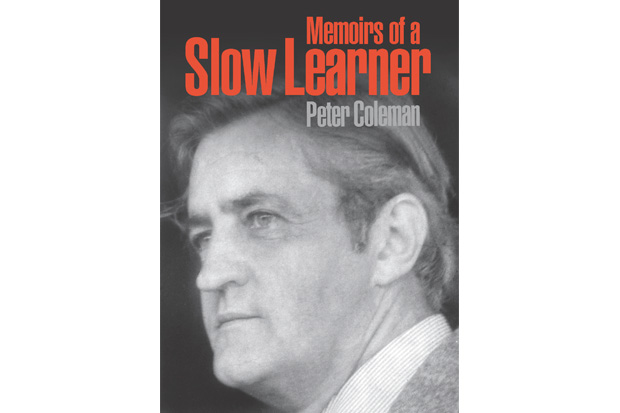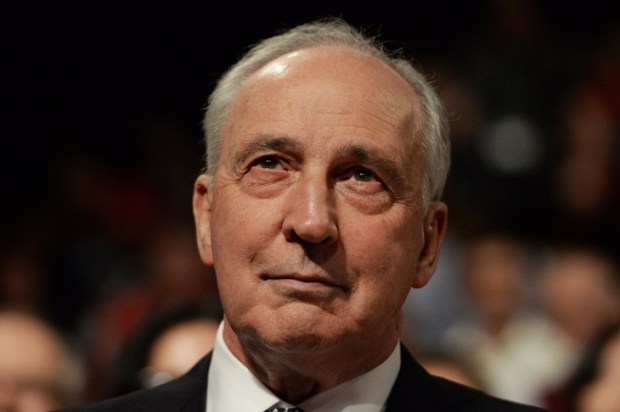‘I’m a revolutionary Marxist, and if you’re not one by the end of semester I haven’t done my job properly,’ quips a Melbourne university lecturer to Matthew Lesh, one of twenty contributors to a collection of essays on education in Australia, launched this week, called Reclaiming Education: Renewing Schools and Universities in Contemporary Western Culture. Melbourne University is one of the most highly ranked in the nation, so is Lesh’s lecturer joking or is it our education system that is the joke? Co-editors Catherine Runcie and David Brooks suggest the latter.
Brooks lays part of the blame on the world-view of a new professional middle-class — part intelligentsia, part bureaucrat — created by the expansion of the university sector. He sees their postmodernist prattle as little more than the paradoxical posturing of court jesters, yet its irrationalism undermines the foundations of the humanities.
When Sydney University, the oldest in Australia, recently decided to peddle its wares under the slogan ‘Unlearn’ it captured the zeitgeist. The university claims it is changing the way it teaches using unlearning, which is ‘about challenging the established and questioning the accepted.’ But why is questioning the establishment view so novel at Sydney University? Presumably because scepticism is no longer seen as a virtue and the sine qua non of critical thinking but is hurled as an insult and used as an excuse to deny a speaker a publicly-funded arena in which to air their views.
T.S. Eliot once argued, as Kevin Donnelly reminds us in his chapter, that universities ‘should stand for the preservation of learning, for the pursuit of truth, and in so far as men are capable of it, the attainment of wisdom’. Nowadays, at Sydney University, students can ‘unlearn truth,’ with Professor Nick Enfield and his team who are building a ‘Bullshit Detector’ and ‘fighting the war against deception through the Post Truth Initiative.’ This turns out to be an electronic platform for the professor to deliver political rants about the election of Trump, the Brexit vote and, of course, climate change.
Karl Schmude observes in his contribution that what we are doing in universities is creating ‘cultural amnesia’. Indeed, the grotesque ignorance of Australia’s so-called educated class would be comic if it weren’t tragic. Thus, a paediatric representative of the Australian Medical Association, who has spent decades both studying at and teaching in Australian universities told the parliamentary press gallery in February that the mental health conditions of asylum seekers on Nauru was worse than at Auschwitz. The doctor later apologised saying that his words had failed to convey the complexity of the author he was citing leaving one to speculate on what he conveys to his students away from the media spotlight?
Simon Haines, head of the Ramsay Centre for Western Civilisation (at which this reviewer has previously worked) makes the case for a liberal arts education of the kind that still exists in the US. Australia has been unable to offer such degrees since the reforms of last century turned universities into utilitarian factories engaged in the mass production of thought workers.
Ironically, as David Furse-Roberts recounts, it was Liberal prime minister Robert Menzies, who pioneered increased access to higher education and created the new universities that led to the burgeoning of the sector. In Menzies time, entry was opened up via merit-based Commonwealth scholarships but since then, the sector has ballooned, and standards have sagged. Greg Melleuish lays the blame on the loss of the pre-liberal emphasis on discipline, the idea that dedication, sacrifice and hard work are necessary to achieve mastery and that without it, one is not equipped to engage in intellectual life.
Steven Schwartz tackles the hoary chestnut of equality of opportunity and whether, in the words of one pundit, ‘if you send your kids to a private school, you are a bad person’. No prizes for guessing that the ABC thinks you are and implores parents to eschew private schooling and ‘bring back some balance’, a quality rarely ascribed to its own programming.
Blaise Joseph in his chapter notes that how much is spent on schools and the extent of parental choice are crucial policy questions but that beyond a certain point, extra money has little positive effect.
Chris Berg and Bella d’Abrera document what has happened to the study of history, the ‘battleground on which politics is fought’, and find, hardly surprisingly, that the history of British institutions, which have been critical to the success of Australia, are largely neglected.
In the second half of the book practitioners offer, as the late, great music educator Richard Gill put it, ‘a little bit of history followed by a call to arms’, James Franklin on the consolations of mathematics, critic Christopher Allen on the unpredictable benefits of art education, Jeremy Bell on the value of narrowness in philosophy, Barry Spurr on the difficult imperative of re-establishing English as a discipline, David Brooks on the role of appreciation in literary study, Natalie Kennedy on the art of making a book your own, Sarah Williams on how to bridge the history gap in the postmodern classroom, Sarah Lawrence on why Latin is not elitist and Ivan Francis Head on the interconnectivity of the Western canon.
The dismal state of education might give rise to pessimism, but contributors offer solutions. David Daintree, president of Campion College recounts that in 1984, when Dr Barry Jones, then the minister for science, asked IBM executives what sort of people they were looking for, he was surprised to learn that little had changed — they sought ‘honours graduates in English or Philosophy who are good at playing chess’. Such a student might be produced by the liberal arts education offered at Campion College but equally by an enthusiastic autodidact. As students increasingly realise that they are being both overcharged and short-changed by the shysters in higher education, the ability to carry a library in one’s pocket means few people have an excuse to be ignorant.
For those interested in educating themselves, reading this volume would make an excellent place to start.
Got something to add? Join the discussion and comment below.
Get 10 issues for just $10
Subscribe to The Spectator Australia today for the next 10 magazine issues, plus full online access, for just $10.
You might disagree with half of it, but you’ll enjoy reading all of it. Try your first month for free, then just $2 a week for the remainder of your first year.












Comments
Don't miss out
Join the conversation with other Spectator Australia readers. Subscribe to leave a comment.
SUBSCRIBEAlready a subscriber? Log in